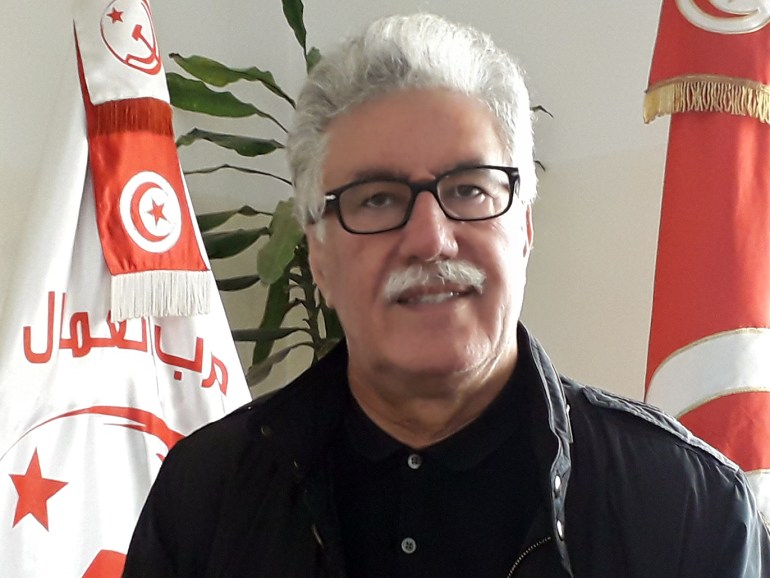Tunisia -
No matter how different the descriptions of what is happening in Tunisia, between the "coup" or "correcting the course of the revolution," many consider what President Qais Said did not surprising, but rather a natural product of the man's conflicting positions with the parliament and the political system, and the battle for influence between the three presidencies.
President Saeed, who came to power from outside the political and partisan system, did not stop showing his negative attitudes toward parties and the existing political system, even before he took power.
It seems that, according to observers, he seized the right moment, taking advantage of the escalating popular anger against Parliament and the government.
Saeed had previously announced, in media statements during his candidacy for the presidential elections, in 2019, that he would "present a legislative initiative to amend the constitution and change the political system."
Over the course of two years of rule, the president has not stopped accusing his opponents without naming them, or talking about conspiracies being hatched against him in dark rooms, threatening everyone with a reckoning "when the moment comes."
Kais Saied in a previous meeting with the leader of the Ennahda movement Rached Ghannouchi, January 2020 (Tunisia Presidency page)
President's missiles
Saeed more than once criticized the performance of parliamentarians, taking advantage of the chaos caused by the conflicts between parliamentary blocs, especially the Free Destourian bloc, and the accompanying escalation of the wave of popular anger, and calls to dissolve parliament.
In a meeting with the head of the Ennahda movement, Rached Ghannouchi, Kais Saied had previously confirmed that he has "the legal means available to him in the constitution, to end the state of political absurdity", and that they are "like missiles on their launch pads."
During the same meeting, Said stressed that the Tunisian constitution enabled him, in one of its chapters, to do what he must do to preserve the Tunisian state.
In reference to Chapter (80) of the Constitution, on which he based the decisions to dismiss the government and dissolve Parliament.
Many consider that the president has constantly sought to co-opt the military and security institutions, and even brought them together under his command, despite this violation of the constitution.
He repeated his speech on more than one occasion in front of military and security formations, that he is the supreme commander of the military and security armed forces, and that this is guaranteed to him by the constitution.
Last April, Saeed also confirmed, during the celebration of the Internal Security Forces Day, that he was the supreme commander of the military and civil forces, which caused a political and legal controversy.
And he had previously promised, in his battle with the heads of government and parliament, who he described as conspirators against legitimacy and the state, that the army and armed forces are ready for them at all times and places, and that he knows very well the details of what they are doing and what they seek to achieve.
Labor Party leader Hamma Hammami: The conflict of the poles in the ruling system has turned into a war of existence (Al-Jazeera)
Poles clash
Commenting on this, the leader of the Labor Party, Hamma Hammami, said that his party had previously warned of the seriousness of the conflict between the poles of the ruling system: the Speaker of Parliament and the government on the one hand, and the President of the Republic on the other, a struggle that turned into a “war of existence.”
Al-Hammami pointed out - in his speech to Al-Jazeera Net - that the most dangerous factor in this conflict, which paved the way for the recent presidential decisions, was the entry of regional powers into the line of political interactions, to resolve the battle in favor of one party at the expense of another.
"I warned on more than one news platform of the danger of a coup that threatens Tunisia with the support of regional parties, which will not necessarily take the form of military coups," he said.
He blamed Tunisia for the political and partisan forces that have ruled for the past 10 years, led by the Ennahda movement, saying that it "created a state of popular resentment and resentment against democracy and party life."
Hammami pointed out that all these justifications cannot be, in any way, a ride that Qais Saeed rides to overthrow the constitution, and to monopolize all powers in his hand.
soft coup document
In light of the current scene in Tunisia, politicians and elites recalled what was published by the British “Middle East Eye” website, about two months ago, when it revealed a document that was said to have been leaked from the office of the Director of the President’s Office, Kais Saied, and talks about a plan for a “constitutional dictatorship.” It is prepared in Tunisia.
The document talks about a plan, described as a "tool" to concentrate all powers in the hands of the President of the Republic, ending with the withdrawal of confidence from the elected government, and placing senior officials and political leaders under house arrest, including Prime Minister Hisham al-Mashishi.
The document referred to the mechanisms for activating the Tunisian president's article (80) of the constitution, which gives him complete control over the state in a state of national emergency.
It also stipulated the appointment of Major General Khaled Al Yahyaoui as Acting Minister of Interior, as well as the deployment of the armed forces at all entrances to cities, institutions and vital facilities.
And local media had already confirmed that President Qais Saeed had assigned Director of Presidential Security, Khaled Al-Yahawi, to supervise the Ministry of the Interior on behalf. Meanwhile, the Tunisian army deployed in cities and sovereign institutions, and prevented the parliament speaker and deputies from entering the parliament, in implementation of the decisions of the President of the Republic.

